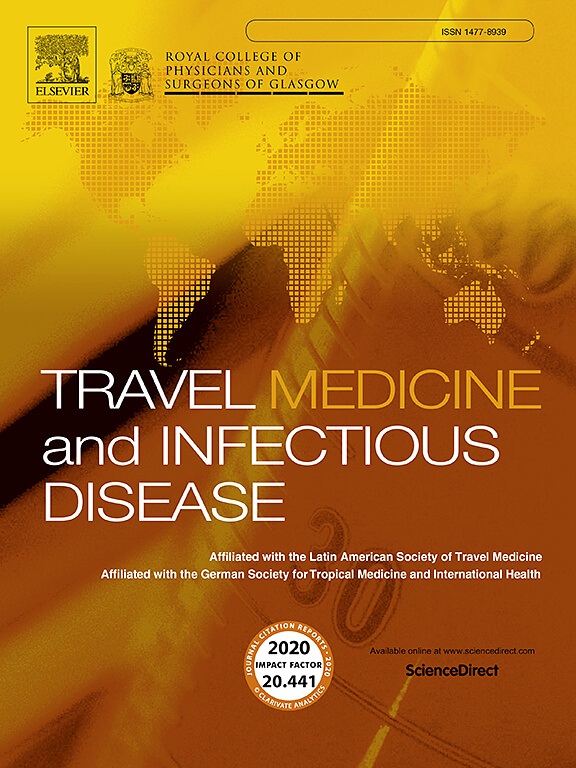准备起飞了吗?探索美国医疗保健提供者旅行前咨询的优先事项、差距、障碍和机会
IF 4.7
3区 医学
Q1 INFECTIOUS DISEASES
引用次数: 0
摘要
具有旅行医学专业知识的医疗保健提供者(HCPs)在旅行前进行咨询可以减轻与旅行相关的健康风险。本分析旨在了解美国HCPs旅行前咨询的教育差距、优先事项、障碍和机会。2024年5月至6月进行了一项电子调查,使用了医学学习小组和国际旅行医学学会和美国热带医学与卫生学会的旅行专家确定的方便样本。共有205名医护人员完成了调查,包括医生(50%)、执业护士(19%)、护士(12%)、药剂师(11%)、医师助理(7%)。大多数(66%)提供旅行前咨询,只有21%持有正式的旅行医学认证。未提供旅行前咨询的医务人员对旅行者腹泻自我治疗、疟疾化学预防、高原病预防、黄热病、日本脑炎、狂犬病和伤寒疫苗接种管理不太满意。最想要的教育主题是旅行疫苗接种(94,46%)、旅行医疗保险(89,43%)和高原疾病预防(86,42%)。提供旅行前咨询的主要障碍是缺乏明确的报销(110.54%)、缺乏保险覆盖(89.43%)和无法储存旅行疫苗(73.36%)。建议的主要干预措施包括初级保健医生教育和社区外展,以增加旅行前咨询的机会和认识。大多数医护人员对旅行前的教育机会感兴趣,但根据经验和证书的不同,舒适度也有所不同,这突出了对有针对性培训的需求,特别是对初级保健提供者。最大的障碍是旅行前咨询的保险覆盖和获得旅行疫苗,这突出了美国医疗保健系统的重大差距。本文章由计算机程序翻译,如有差异,请以英文原文为准。
Ready for takeoff? exploring United States health care providers’ pretravel consultation priorities, gaps, barriers, and opportunities
Pretravel consultation by healthcare providers (HCPs) with travel medicine expertise can mitigate travel-related health risks. This analysis aimed to understand US-based HCPs' pretravel consultation educational gaps, priorities, barriers, and opportunities. An electronic survey was conducted May–June 2024, using a convenience sample of HCPs identified through the Med Learning Group and travel specialists from the International Society of Travel Medicine and American Society of Tropical Medicine and Hygiene. In total, 205 HCPs completed the survey, including physicians (50 %), nurse practitioners (19 %), nurses (12 %), pharmacists (11 %), physician associates (7 %). Most (66 %) provided pretravel consultations and only 21 % held formal travel medicine certification. HCPs not providing pretravel consultation were less comfortable with traveler's diarrhea self-treatment, malaria chemoprophylaxis, altitude illness prevention, yellow fever, Japanese encephalitis, rabies, and typhoid vaccination management. The most desired topics for education were travel vaccinations (94, 46 %), travel medicine insurance (89, 43 %), and altitude illness prevention (86, 42 %). Major barriers to providing pretravel consultation were lack of clarity about reimbursement (110, 54 %), lack of insurance coverage (89, 43 %), and inability to stock travel vaccines (73, 36 %). Top interventions suggested to increase access to and awareness of pretravel consultation included primary care physician education and community outreach. Most HCPs were interested in pretravel educational opportunities, but comfort varied by experience and certification, highlighting need for targeted training, especially for primary care providers. Top barriers were insurance coverage for pretravel consultation and access to travel vaccines, underscoring critical gaps in the US healthcare system.
求助全文
通过发布文献求助,成功后即可免费获取论文全文。
去求助
来源期刊

Travel Medicine and Infectious Disease
PUBLIC, ENVIRONMENTAL & OCCUPATIONAL HEALTH-INFECTIOUS DISEASES
CiteScore
19.40
自引率
1.70%
发文量
211
审稿时长
49 days
期刊介绍:
Travel Medicine and Infectious Disease
Publication Scope:
Publishes original papers, reviews, and consensus papers
Primary theme: infectious disease in the context of travel medicine
Focus Areas:
Epidemiology and surveillance of travel-related illness
Prevention and treatment of travel-associated infections
Malaria prevention and treatment
Travellers' diarrhoea
Infections associated with mass gatherings
Migration-related infections
Vaccines and vaccine-preventable disease
Global policy/regulations for disease prevention and control
Practical clinical issues for travel and tropical medicine practitioners
Coverage:
Addresses areas of controversy and debate in travel medicine
Aims to inform guidelines and policy pertinent to travel medicine and the prevention of infectious disease
Publication Features:
Offers a fast peer-review process
Provides early online publication of accepted manuscripts
Aims to publish cutting-edge papers
 求助内容:
求助内容: 应助结果提醒方式:
应助结果提醒方式:


